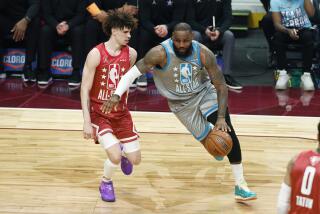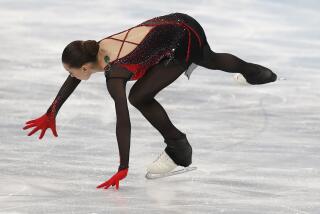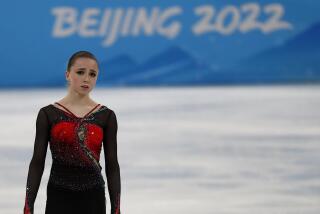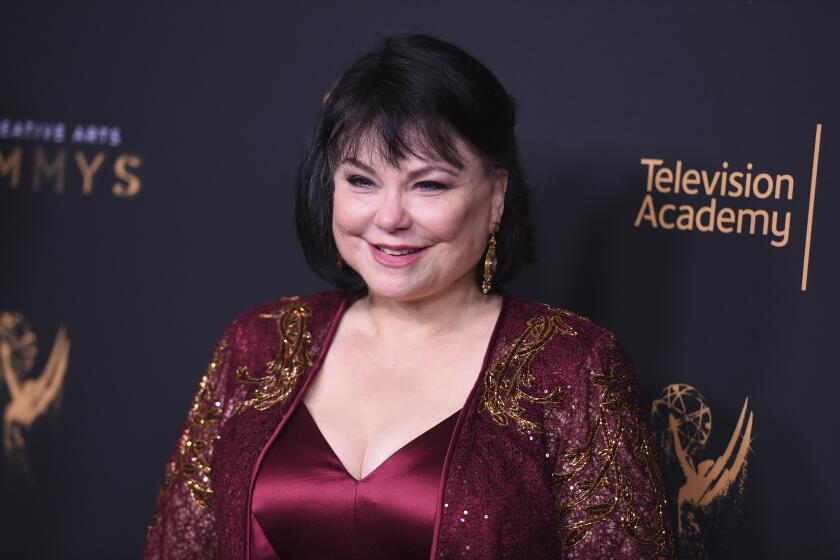Thrill of victory — and agony of defeat— in NBC’s Olympics coverage
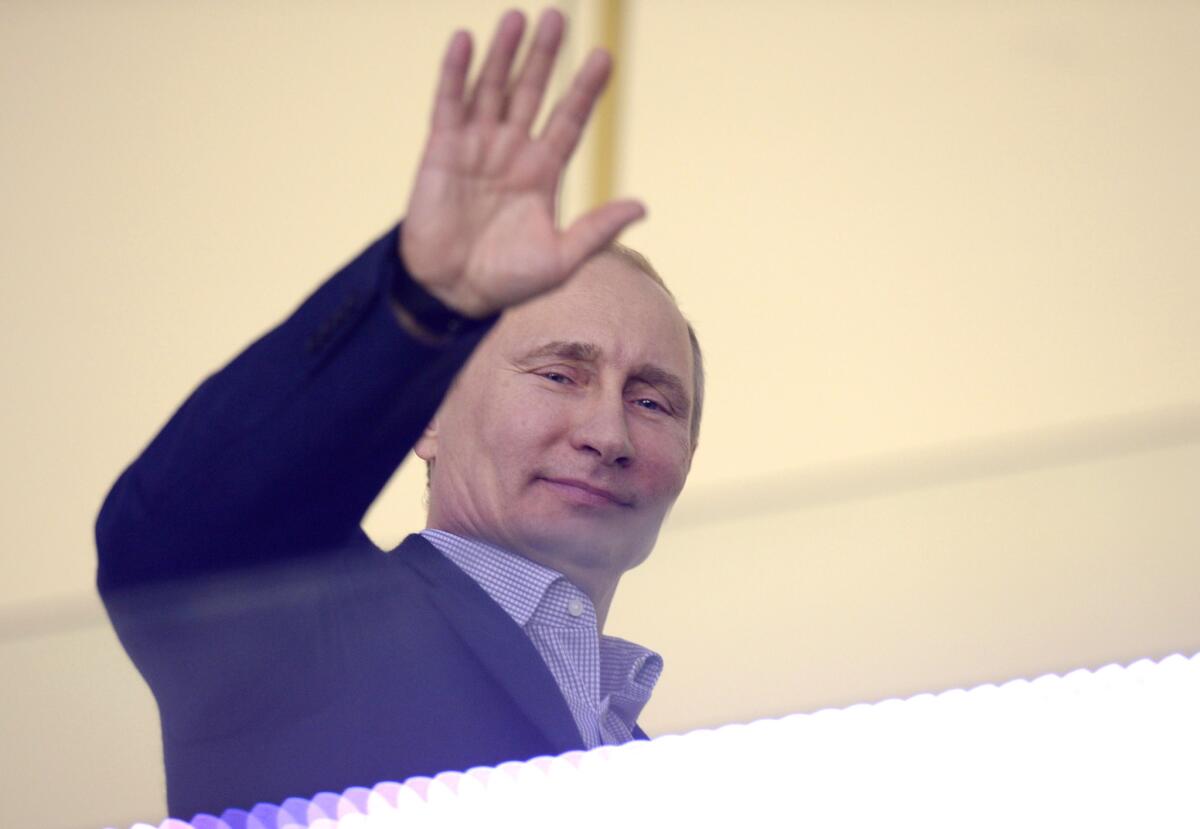
U.S. athletes have earned mixed marks at the Sochi Games; for every triumph in a sport such as slopestyle or luge, there’s been a disappointment in skiing or speed skating.
The same might be said of NBC, whose decision to broadcast the most hours ever of Winter Olympics coverage has resulted in not only compelling television moments but also weirdness and awkwardness.
This past weekend demonstrated this tale of two runs.
Though the network didn’t skimp on the hype for Saturday’s U.S.-Russia hockey matchup, essentially a pro-forma group-stage game — “Some Cold Wars don’t end,” intoned veteran play-by-play man Mike “Doc” Emrick in a pregame package — it also rose to the occasion.
PHOTOS: Winter Olympics in film
Its coverage included effective cutaways to in-house fan Vladimir Putin, a building sense of excitement from Emrick and partner Ed Olczyk at the game’s eight-round shootout and elegant postgame coverage later in the day, including “Miracle on Ice” voice Al Michaels interviewing 2014 hero T.J. Oshie.
But it came on the heels of a stranger display Friday, in which studio host Meredith Vieira discussed a miscarriage with skeleton silver medalist Noelle Pikus-Pace, while trackside reporter Lewis Johnson elicited tears from Pikus-Pace teammate Katie Uhlaender by asking her about her dead father.
The skeleton moments continued an eyebrow-raising trend in Olympics coverage to emphasize personal tragedy over in-competition strategy and achievement. Nate Carlisle, a reporter at the Salt Lake Tribune, the hometown paper of many ski and snowboard athletes, has been running a spreadsheet calculating the number of stories featuring competitors’ dead relatives. Through Saturday, Carlisle found, there had been 25 such stories, an average of nearly three per day. On Sunday night the death preoccupation continued when NBC’s Christin Cooper prodded Bode Miller, after he won bronze in the Super-G, on the loss of his brother, prompting the skier to fall to the ground in tears and the Twittersphere to light up.
Vieira’s presence is itself part of a surprise storyline that began when longtime studio anchor Bob Costas appeared on the first day of the Games with owlish glasses and an eye infection. As the Games progressed, Costas had to temporarily withdraw from the chair, and starting early last week, Vieira and “Today” co-host Matt Lauer were forced into double duty.
NBC executives told reporters Thursday that Costas was being treated by Russian doctors, but as of Sunday morning, there had been no word of his return.
PHOTOS: Olympic Games TV moments worth remembering
All this comes with high stakes. Three years ago, NBC agreed to pay $4.4 billion to broadcast four Olympics through 2020. It has also staked programming strategy on the Olympics, as the Games serve as a cornerstone of the newly rebranded NBC Sports Network, its would-be competitor to ESPN.
As for the flagship, the numbers have been decent if not overwhelming. Prime-time ratings for Sochi have on most days landed between the popular 2010 Games in Vancouver and the under-viewed telecast in Torino four years prior, ranging between a low of 19.2 million viewers during a Friday anchored by a suspense-light men’s free skate program and the 31.7 million of opening night on Feb. 7.
The smaller numbers compared to 2010 aren’t entirely NBC’s fault — the growth of social media and a time difference to the U.S. of at least nine hours robs many of the events of their live-event drama. Still, some of the network’s decisions may serve to turn off some viewers, including its compression of many non-American athletes out of its coverage (commercial time is valuable too, after all) and a prime-time packaging of events in small chunks to maximize cliffhangers.
The network also has seen highs and lows in the broadcast booth.
Speed skating has been a standout — particularly on the color-commentating side with veteran Dan Jansen and new commentator Apolo Ohno in long and short track, respectively. Ohno has been a pleasant surprise; if he can be a little too eager to declaim big moments, he also offers game-within-a-game nuance stemming from his experience.
PHOTOS: Celebrities by The Times
But it also has seen insight-challenged breathlessness from such commentators as luge play-by-play man Leigh Diffey, an import from motor sports coverage, and an abundance of melodrama from its figure-skating troika of Tom Hammond, Scott Hamilton and Sandra Bezic.
NBC has also shown an ability to adjust when narratives have not unfolded as hoped. When moguls favorite Hannah Kearney ended up with bronze and gave a beleaguered post-race interview, commentators pivoted to cover the story, with Costas noting that she sounded more devastated than disappointed.
It has ridden the usual Bode Miller roller coaster, offering a shake of the collective head when the mercurial American skier disappointed in events like the downhill and then perking up when he notched a surprise bronze Sunday in the Super G (before, of course, all that post-race craziness).
And when Shaun White finished off the snowboard halfpipe podium — denying him a historic gold-medal threepeat — leaving NBC without a male hero in the quintessentially American sport, the network handled it in a quintessentially American way. There was a remorseful grimace from broadcasters — Cris Collinsworth compared it to Peyton Manning fizzling in the Super Bowl.
Two days later, however, when another freestyle downhill event, ski slopestyle, saw the first American podium sweep since 2002, commentators quickly moved on from White. They reveled in the story of the blessed trio, particularly gold medalist Joss Christensen.
When you’re down, swing up.
More to Read
The complete guide to home viewing
Get Screen Gab for everything about the TV shows and streaming movies everyone’s talking about.
You may occasionally receive promotional content from the Los Angeles Times.
